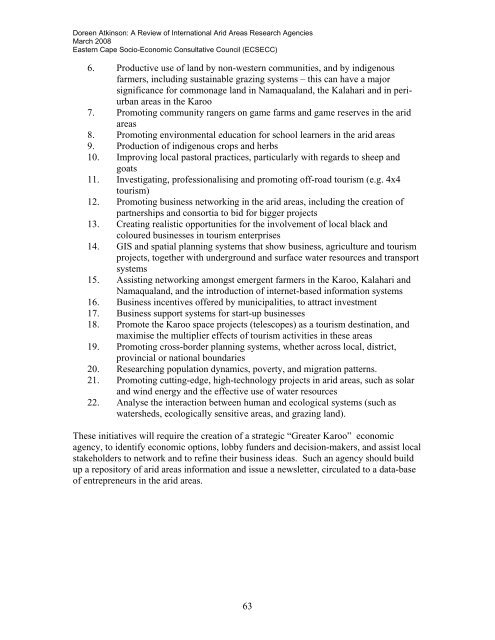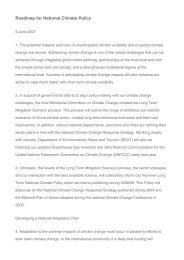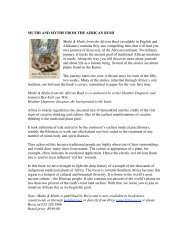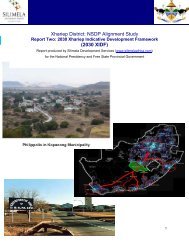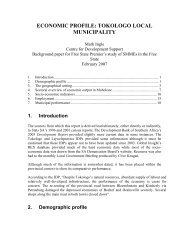report - Arid Areas Programme
report - Arid Areas Programme
report - Arid Areas Programme
Create successful ePaper yourself
Turn your PDF publications into a flip-book with our unique Google optimized e-Paper software.
Doreen Atkinson: A Review of International <strong>Arid</strong> <strong>Areas</strong> Research Agencies<br />
March 2008<br />
Eastern Cape Socio-Economic Consultative Council (ECSECC)<br />
6. Productive use of land by non-western communities, and by indigenous<br />
farmers, including sustainable grazing systems – this can have a major<br />
significance for commonage land in Namaqualand, the Kalahari and in periurban<br />
areas in the Karoo<br />
7. Promoting community rangers on game farms and game reserves in the arid<br />
areas<br />
8. Promoting environmental education for school learners in the arid areas<br />
9. Production of indigenous crops and herbs<br />
10. Improving local pastoral practices, particularly with regards to sheep and<br />
goats<br />
11. Investigating, professionalising and promoting off-road tourism (e.g. 4x4<br />
tourism)<br />
12. Promoting business networking in the arid areas, including the creation of<br />
partnerships and consortia to bid for bigger projects<br />
13. Creating realistic opportunities for the involvement of local black and<br />
coloured businesses in tourism enterprises<br />
14. GIS and spatial planning systems that show business, agriculture and tourism<br />
projects, together with underground and surface water resources and transport<br />
systems<br />
15. Assisting networking amongst emergent farmers in the Karoo, Kalahari and<br />
Namaqualand, and the introduction of internet-based information systems<br />
16. Business incentives offered by municipalities, to attract investment<br />
17. Business support systems for start-up businesses<br />
18. Promote the Karoo space projects (telescopes) as a tourism destination, and<br />
maximise the multiplier effects of tourism activities in these areas<br />
19. Promoting cross-border planning systems, whether across local, district,<br />
provincial or national boundaries<br />
20. Researching population dynamics, poverty, and migration patterns.<br />
21. Promoting cutting-edge, high-technology projects in arid areas, such as solar<br />
and wind energy and the effective use of water resources<br />
22. Analyse the interaction between human and ecological systems (such as<br />
watersheds, ecologically sensitive areas, and grazing land).<br />
These initiatives will require the creation of a strategic “Greater Karoo” economic<br />
agency, to identify economic options, lobby funders and decision-makers, and assist local<br />
stakeholders to network and to refine their business ideas. Such an agency should build<br />
up a repository of arid areas information and issue a newsletter, circulated to a data-base<br />
of entrepreneurs in the arid areas.<br />
63


